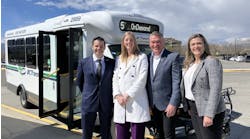The Southwest Ohio Regional Transit Authority Board of Trustees voted to express its intent to place a Hamilton County-wide sales tax levy on the November 2018 ballot. The percentage of the proposed increase was not specified at the board’s monthly meeting on Tuesday. SORTA also directed its staff to encourage the Mayor and City Council to achieve clarity on the disposition of the city earnings tax now being collected for public transportation purposes.
If passed, a sales tax initiative would help expand and improve Metro bus service throughout Hamilton County. Depending on the level, improvements could include new crosstown routes and circulators, new Metro*Plus services and future Bus Rapid Transit, more frequent/extended service on existing routes, expanded Access service, new transit centers and park & rides, right-sized vehicles, better connections to jobs and better use of technology to improve the user experience.
No funds from a Metro tax initiative would go toward the Cincinnati Bell Connector. About half of SORTA’s operating budget comes from 3/10th of 1 percent of the City of Cincinnati earnings tax that is dedicated for transit use only. SORTA does not currently receive funding from Hamilton County. The transit agency is required by law to balance its budget.
“Metro has an opportunity to expand and improve bus service to better serve those who need it and those who choose to use it,” said Jason Dunn, SORTA board chair. “We have much work ahead on this path toward a more connected region that we believe will improve our community’s quality of life.”
“Something has to change,” he continued. “Our reliance on funding from the City of Cincinnati has not allowed us to serve areas outside of the city, where thousands of jobs are located, many of them available to city residents if they can get there. If nothing changes, Metro’s situation only gets worse, and area bus riders will suffer.”
A University of Cincinnati (UC) Economics Center study found that 75,000 jobs in the region are not easily accessible by Metro.
Next steps for SORTA include receiving final reports from AECOM as well as the UC Economics Center regarding the community impacts of the proposed improvements.




